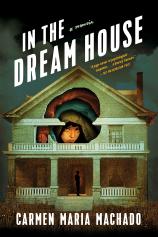In the Dream House: A Memoir
Review
In the Dream House: A Memoir
Carmen Maria Machado’s memoir, IN THE DREAM HOUSE, is a messy, ferocious thing. Brilliant and devastating, incisive and defiant, it is at once an intensely personal evocation of a queer woman’s domestic emotional abuse, and the gestation of an archive investigating the conspicuous absence of research and narrative documenting queer women’s domestic abuse throughout history. Because at the heart of this book, Machado is trying to reckon with her recent, formative, deeply traumatic past, and there are precious few documented precedents. Not only did this complicate her understanding of her situation while it was ongoing --- that is the violence of erasure, evidence of the need for true representation beyond lip service or tokenism --- she must constantly ask of herself: How do I tell this story?
When they met, the woman from the Dream House said she was in an open relationship. Machado takes us through the whirlwind love affair, allowing us to witness the kinetic shift as the woman from the Dream House moves from fairy tale to horror story. Of course, the horror story was there all along. This was never a fairy tale. But Machado didn’t know that when she began. You nearly never do, but queer folks in particular never do. Not like this, not when the villain isn’t systemic homophobia or a person or people who embody it, but your partner in the narrative. You don’t see it coming. How could you? We don’t talk about it. We don’t tell that story.
"The material is so dark it nearly feels wrong to call it pleasurable to read, but it is, because Machado is that good... Machado has crafted a work here that is incisive and vulnerable, mesmeric and haunting."
Anyone who has read her magnificent debut short story collection, HER BODY AND OTHER PARTIES, knows that Machado is a master of form and style, manipulating them to get at the heart of each work. IN THE DREAM HOUSE is a collection of vignettes and short pieces: “Dream House as Lesbian Cult Classic,” “Dream House as Hotel Room in Iowa City,” “Dream House as Chekhov’s Gun,” “Dream House as Sniffs from the Ink of Women,” “Dream House as Choose Your Own Adventure,” “Dream House as Haunted Mansion.”
The pieces work incredibly effectively: guiding the reader into the fantasy of her relationship, through the creeping, emerging horror of it, the gaslit, frantic terror and depression --- and back out again, into the present, in which Machado is happily married to another woman and is able to create art and archive from her trauma.
The abuse, largely, isn’t physical. It’s verbal, it’s emotional manipulation, it’s gaslighting. It weaponizes all the parts of Machado already made vulnerable through queerness, fatness, womanhood and race. Because it’s not physical, it’s harder to prove to herself that it’s happening. Because the perpetrator is not a man, it’s more difficult to contextualize within our schemas of abuse.
The material is so dark it nearly feels wrong to call it pleasurable to read, but it is, because Machado is that good, because each vignette packs such an intense punch both by itself and as part of this carefully curated narrative. This is far from the only book about an abused woman --- those are everywhere, in every genre --- but they’re infrequently told from the perspective of the survivor, wrangling with the messy intricacies of abuse and internalized guilt and misogyny, and contextualizing the experience within a broader, largely obscured history and present.
Machado has crafted a work here that is incisive and vulnerable, mesmeric and haunting. There is a monster at the center of the book, and you’ve fallen in something like love with her. What does that say about you? (It doesn’t, it doesn’t). She cracks open the narrative of domestic abuse among queer women (How could you do this to us? When they already think the worst of us? Aren’t we on the same side?) and exposes the wound for the wreckage it is. It is intimate and unapologetic, a baring of scar tissue that serves as an act of liberation. This happened. And it has been happening, and will keep on happening, and we need to talk about it.
IN THE DREAM HOUSE is unsettling because it should be. It’s vindicating even though it shouldn’t have to be. Harrowing and incandescent, it might resist being called a triumph, but it reads like one. It will burrow in, sit with the reader and shift you from within. I am profoundly grateful for this book and everything Machado has written.
Reviewed by Maya Gittelman on November 15, 2019
In the Dream House: A Memoir
- Publication Date: December 1, 2020
- Genres: Memoir, Nonfiction
- Paperback: 272 pages
- Publisher: Graywolf Press
- ISBN-10: 1644450380
- ISBN-13: 9781644450383




